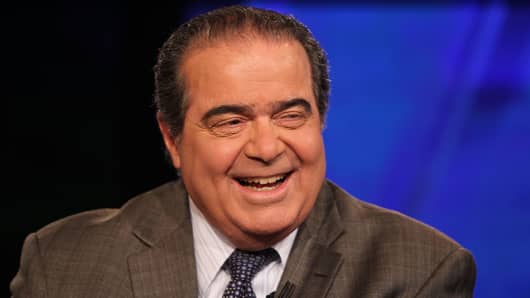The untimely death of Justice Antonin Scalia marks the end of a generation-long career on the Supreme Court in which he profoundly influenced the terms of legal debate in the United States. Those of us who were privileged to serve as his law clerks were witnesses to this remarkable achievement, which was the product of his intellect and his unyielding commitment to the rule of law. We were also witnesses to a life greatly lived.
Prior to Justice Scalia's appointment in 1986, the Supreme Court decided its cases—both those interpreting the constitution and those interpreting federal statutes—without much regard to the methods of interpretation it was using. The justices wrote their opinions and issued their judgments, and routinely glossed over the crucial questions regarding the legitimacy of how the court went about its work.
That changed, and changed dramatically, when the genuinely brilliant—words often thrown around, but rarely as apt—Antonin Scalia came on the bench. In constitutional law, he famously championed the doctrine of originalism, which insists that the constitution as law must be interpreted to implement the meaning understood by the lawmakers—the people whose consent is essential to legitimate governance in our republic—at the time they made the law. Nobody can do constitutional law today without dealing seriously with the claims of originalism. And in fields as varied as the Second Amendment and criminal procedure, he had a great deal of success in persuading his colleagues to employ an originalist approach.
Although less prominent in the public mind, lawyers and judges know that Justice Scalia's influence was greater still in the field of statutory interpretation. He was a tireless advocate for textualism—the practice of interpreting statutes according to the texts that were actually enacted by Congress, rather than by resorting to Congress's general (and unenacted) purposes as gleaned from extraneous sources like legislative history. Because of Justice Scalia's efforts, statutory interpretation as practiced in the Supreme Court today focuses first on statutory text, with recourse to materials beyond the text limited to unusual circumstances. Today the court doesn't always deploy textualism, but it decides cases only after first carefully dealing with the statutory text.
How did he achieve this influence? Justice Scalia was known as a larger-than-life figure, both during oral arguments and in public speaking more generally. He certainly had a big personality; his quick wit and talent as a raconteur entertained many an audience. Some in the media liked to caricature the justice as an angry man who lashed out when he didn't get his way, but that was far from reality. He was warm and joyful, and quick to laugh, including with those whose views were far from his own. When it came to his opinions, he was tireless in seeking excellence and rigor. All that mattered to him was getting the case right under the law—even (and maybe especially) when he didn't like the outcome. His force of reasoning, his adherence to principle, and his remarkable prose, all produced opinions that will live forever in American law. Justice Scalia transformed the terms of legal debate by carefully and relentlessly making the case for his views, year after year, in opinion after opinion.
Those who were privileged to work with him saw this unyielding focus on deciding cases correctly according to the law. You couldn't cut legal corners with the justice, and he was always quick with a follow up question. In his chambers, every case was debated as long and as fully as it took for the justice to conclude that he had arrived at the best answer he could. No views were off limits, and he encouraged his law clerks to challenge him. The last thing he wanted was to get a case wrong because he hadn't fully thought it through. His law clerks regularly saw him change his mind when he became persuaded that his initial views were mistaken. For the young lawyers who were fortunate to serve as his law clerks, it was priceless training to witness a real judge go about his job—deciding each case on its merits, without fear or favor, and following the law wherever it led.
But there was so much more to the experience than even that. We also saw a good man, who loved his job and his country, but loved even more his family and his God. The memories I will cherish most are the quiet conversations over the last 25 years about the things that really matter. How does one live a faithful life? How does one raise children well? How does one face the challenge of chronic sickness? There was no bluster in Justice Scalia about these sorts of things, only a thoughtful and loving mentor and friend. When it really mattered, he was wise and gentle. Yes, he lived greatly in the law, and had a great impact on our public life. But the real Antonin Scalia was more than that—he was a great man.
Commentary by William Kelley, an associate professor of constitutional law at Notre Dame Law School. He served as law clerk to Justice Scalia from 1988-89.
For more insight from CNBC contributors, follow
@CNBCopinion
on Twitter.




